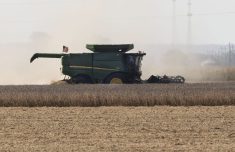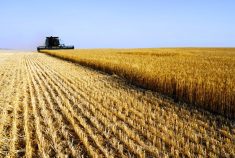A survey of Canadian farmers suggests there are 651,000 acres of cropland with glyphosate resistant kochia on the Prairies, which is exponentially higher than official estimates of 8,000 acres.
In an online poll of more than 2,000 Canadian growers, Stratus Agri-Marketing determined there are 502,000 acres of glyphosate resistant kochia in Saskatchewan, 126,000 acres in Alberta-British Columbia and 23,000 acres in Manitoba.
However, the acreage data represents farmer perceptions about glyphosate resistant kochia rather than fields with confirmed resistance, said Kent Fraser, vice president of Stratus.
“It is a big number and it’s very different from the number that the scientists would put on the table,” he said.
Read Also

Alberta harvest wrapping up: report
Harvest operations advanced to 96 per cent complete in Alberta as of Oct. 7, with only a few late-seeded cereal and canola fields remaining, according to the latest provincial crop report.
Stratus has conducted several surveys of U.S. growers about glyphosate resistance, but the latest survey, which was released to the media in early May, is the company’s first poll of Canadian growers on the topic.
In 2011 and 2012, Agriculture Canada weed experts found glyphosate resistant kochia in fields in southern Alberta and fields around Swift Current, Sask.
Laboratory testing confirmed the presence of glyphosate resistance at those sites.
In contrast, the Stratus data is based on farmer perception of glyphosate resistance, Fraser said.
“The fact that there’s a big difference (in acreage) doesn’t really surprise me, because we’re talking about two different things.”
Hugh Beckie, a herbicide resistance expert with Agriculture Canada in Saskatoon, said the acreage figure is surprising but it’s hard to assess its accuracy.
“We haven’t surveyed too much of Western Canada for glyphosate resistant kochia yet,” he said.
“Usually, with regards to glyphosate (resistant) kochia, I think farmers now know what to look for. I would guess those numbers are certainly a possibility. But it’s hard to verify based on perception.”
Kochia with resistance to glyphosate has been confirmed in about 50 fields in Alberta and Saskatchewan, Beckie said. Assuming each field represents a quarter section, it equates to 8,000 acres.
However, Beckie also observed resistance in surrounding fields when he visited sites to collect weed seed samples.
“Fifty fields is certainly an underestimation,” he said. “But still there’s a big gap between that (acreage) number and the number in the survey.”
The online farmer survey, which was conducted in February and March, suggested that 270,000 acres of Ontario cropland have glyphosate resistant weeds.
Peter Sikkema, a University of Guelph plant science professor and weed management specialist, didn’t want to comment on the acreage estimates in the survey, but did say official data in Ontario is incorrect.
“We do the surveys in Ontario, in terms of the number of sites with glyphosate resistant giant ragweed, Canada fleabane and common ragweed. I will tell you immediately that our surveys underestimate the problem.”
He said 82 Ontario fields have confirmed giant ragweed resistance to glyphosate, 155 fields have Canada fleabane resistance and one has common ragweed resistantance.
“I know as soon as I (say) those numbers … that those numbers are incorrect. We know for sure it’s in those fields,” he said.
“We also know for sure that there are other fields (with glyphosate resistance).”
The Stratus Agri-Marketing survey reported that one million acres of farmland in Canada have glyphosate resistance, which includes fields with resistance to volunteer canola.
“Some (farmers) mentioned glyphosate resistant canola. We’ll, that’s stuff that we made,” Fraser said in explaining why volunteer canola was in the survey data.
Fraser said the positive news is that 42 percent of producers reported they are very concerned about glyphosate resistant weeds.
It’s unfortunate that Canadian growers have or are worried about glyphosate resistance, but farmers will only take action if they perceive it is a problem, Fraser said.
Sikkema agreed that Canadian growers are paying attention to glyphosate resistance.
“I think it’s a good thing that we’re increasing the awareness. Hopefully by increasing the awareness we will reduce the number of acres affected in the future.”

















